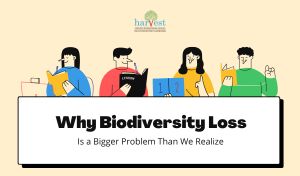Why Biodiversity Loss Is a Bigger Problem Than We Realize
Introduction
Biodiversity is the foundation of life on Earth, providing everything from clean air and water to food and medicine. Yet, human activities have accelerated biodiversity loss at an alarming rate, leading to significant ecological and societal consequences. While the effects of biodiversity loss may not be immediately apparent, they pose long-term threats to our planet’s health and survival. At Harvest International School, recognized among the best schools in Sarjapur Road Bangalore, we believe in fostering environmental consciousness among students to safeguard our natural heritage.
Understanding Biodiversity and Its Importance
Biodiversity refers to the variety of life forms on Earth, including plants, animals, fungi, and microorganisms. It plays a crucial role in maintaining the balance of ecosystems and supporting human life. As one of the best schools in Bangalore India, we emphasize the importance of environmental education to help students recognize how biodiversity contributes to climate stability, agriculture, and overall ecosystem resilience.
- Ecological Balance: Biodiversity ensures that ecosystems function efficiently, regulating air quality, soil fertility, and water cycles.
- Food Security: Diverse plant and animal species contribute to sustainable agriculture and food production.
- Medical Advancements: Many medicines are derived from plants and microorganisms, highlighting the importance of preserving biodiversity for future discoveries.
- Economic Stability: Industries such as agriculture, fisheries, and tourism rely heavily on biodiversity.
We incorporate these principles into our curriculum to inspire students to be responsible global citizens.
The Growing Threat of Biodiversity Loss
Despite its significance, biodiversity is under severe threat due to human activities. Some of the primary causes of biodiversity loss include:
- Deforestation and Habitat Destruction: Forests are cleared for agriculture, urban development, and industries, leading to habitat loss for countless species.
- Climate Change: Rising temperatures, unpredictable weather patterns, and extreme climatic events disrupt ecosystems and threaten wildlife.
- Pollution: Plastic waste, chemical runoff, and air pollution degrade ecosystems, making it difficult for species to survive.
- Overexploitation: Overfishing, hunting, and poaching put immense pressure on animal populations, leading to species decline.
- Invasive Species: The introduction of non-native species disrupts ecosystems and outcompetes indigenous flora and fauna.
Being among the top schools in Bangalore, Harvest International encourages students to explore these pressing issues through hands-on learning experiences, projects, and discussions that inspire solutions for biodiversity conservation.
The Consequences of Biodiversity Loss
1. Threat to Human Survival
The loss of biodiversity weakens ecosystem services that humans rely on, such as pollination, water purification, and soil fertility. Without these, agricultural productivity would decline, leading to food shortages and economic instability. At Harvest International, one of the best schools in Sarjapur Road Bangalore, we educate students on sustainable agriculture and eco-friendly practices to mitigate these risks.
2. Increased Disease Outbreaks
The destruction of wildlife habitats forces animals to migrate closer to human settlements, increasing the risk of zoonotic diseases (such as COVID-19 and Ebola) spreading to human populations. Biodiversity loss can disrupt disease regulation, making pandemics more frequent and severe.
3. Economic Impact
Biodiversity-rich regions, such as rainforests and coral reefs, support tourism and fisheries, generating billions of dollars in revenue. The decline in biodiversity leads to economic losses, particularly in countries that depend on natural resources. As part of our commitment to being one of the best schools in Bangalore India, we integrate economic and environmental studies, helping students understand the interdependence between nature and financial stability.
4. Climate Change Acceleration
Forests and oceans act as carbon sinks, absorbing carbon dioxide and mitigating global warming. Deforestation and marine ecosystem degradation release stored carbon, exacerbating climate change. As a top-ranking institution among CBSE schools in Bangalore Sarjapur Road, we encourage students to participate in tree-planting drives, sustainability projects, and conservation initiatives.
Solutions to Biodiversity Loss
Despite the alarming rate of biodiversity decline, there are ways to reverse the trend:
1. Conservation Efforts
- Protected Areas: National parks, wildlife reserves, and marine sanctuaries help preserve biodiversity.
- Reforestation Projects: Planting native trees can restore lost habitats and support ecosystems.
- Wildlife Protection Laws: Strict regulations against poaching and illegal wildlife trade are crucial.
2. Sustainable Practices
- Eco-friendly Agriculture: Crop rotation, organic farming, and reduced pesticide use help maintain soil fertility.
- Waste Management: Reducing plastic waste, recycling, and composting contribute to healthier ecosystems.
- Sustainable Fishing and Hunting: Regulations on fishing quotas and hunting help maintain species populations.
3. Education and Awareness
- Environmental Education: Schools play a key role in fostering eco-consciousness among students.
- Community Engagement: Encouraging local communities to participate in conservation efforts ensures long-term impact.
- Innovative Solutions: Research and technology can aid biodiversity restoration efforts.
Harvest International School, recognized among the top schools in Bangalore, actively promotes these solutions by integrating environmental science into its curriculum, hosting sustainability workshops, and engaging students in hands-on conservation initiatives.
How Harvest International School Leads the Way
As one of the best schools in Sarjapur Road Bangalore, we are committed to nurturing young environmental leaders who understand the gravity of biodiversity loss and are equipped to take action. Our initiatives include:
- Green Campus Initiatives: Implementing rainwater harvesting, and organic gardens.
- Field Trips: Visits to national parks and wildlife sanctuaries to foster appreciation for biodiversity.
- Project-Based Learning: Encouraging students to develop innovative solutions for local environmental issues.
A Call to Action
The loss of biodiversity is not just an environmental issue; it is a crisis that threatens our survival. We believe that education is the key to change. By raising awareness, implementing sustainable practices, and fostering a sense of responsibility among students, we can work towards a future where biodiversity thrives.
We urge our students, parents, and community members to take action—support conservation projects, reduce waste, plant trees, and advocate for policies that protect our planet. By working together, we can make a difference and ensure that future generations inherit a world rich in biodiversity.
Conclusion
Biodiversity is the backbone of life, supporting ecosystems, economies, and human well-being. The consequences of its loss extend far beyond what we realize, affecting every aspect of our lives. As one of the leading CBSE schools in Bangalore Sarjapur Road, Harvest International School is dedicated to empowering students with the knowledge and skills needed to address these challenges. Through education, conservation, and community involvement, we can work towards preserving biodiversity and securing a sustainable future for all.
Let us recognize the urgency of this crisis and take meaningful steps toward restoring balance in nature. Together, we can protect the planet and its incredible biodiversity for generations to come.





